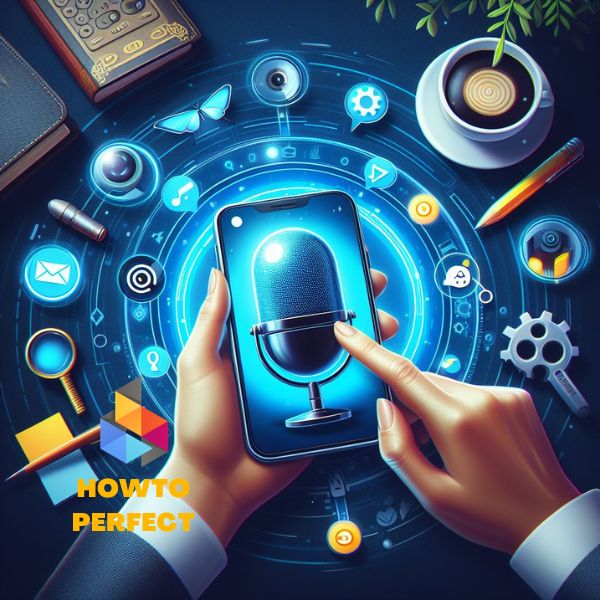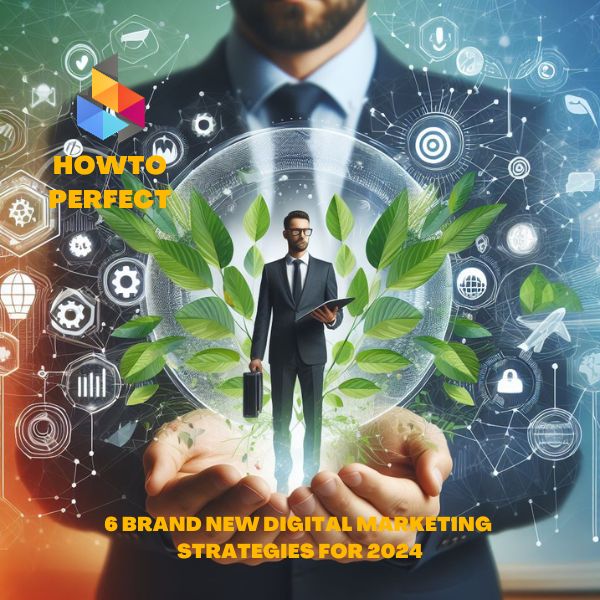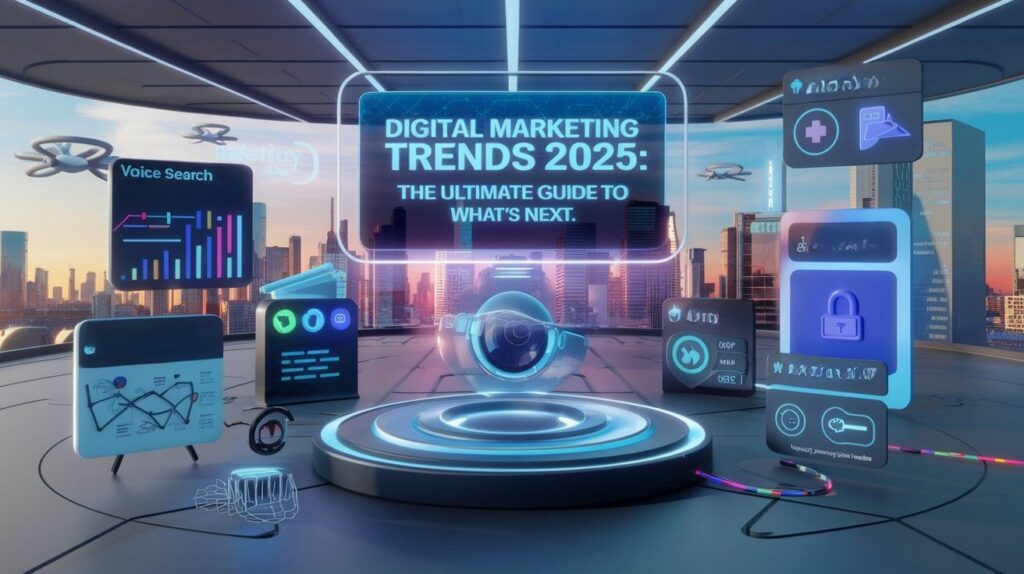As we enter 2024, the world of digital marketing is dynamically evolving and adapting to new technologies and trends. Both artificial intelligence and social networks present new opportunities for marketers and customers. It is essential for not only digital marketers, but also digital marketing service orderers to adapt to these changes and utilize new channels and methods.
Efficiency and precision in campaign targeting are key to reducing the cost of acquiring a customer (CPA) and increasing brand value. But how can we adapt to these changes and use them to our advantage?
Read BRAND NEW Digital Marketing Strategies for 2024.
Table of Contents
ToggleNew Digital Marketing Strategies for 2024
In this article, we will look at six new digital marketing strategies for 2024 that could answer these questions. From using artificial intelligence for better customer segmentation and content personalization, to optimizing for voice search, to using virtual and augmented reality to provide unique experiences.
We will also focus on the growing trend of social commerce and the importance of sustainability in the eyes of today’s customers. Prepare for a year full of innovation and new opportunities in digital marketing!
1. The Power of AI in Digital Marketing: Segmentation, Personalization, and Prediction
Artificial Intelligence (AI) is revolutionizing the landscape of digital marketing, bringing about a significant shift in the way brands connect with their customers. The power of AI in digital marketing lies in its ability to process huge amounts of data to extract meaningful insights. It allows marketers to understand their audience on a much deeper level, enabling highly targeted marketing that was not possible before.
Segmentation, personalization, and prediction are three key areas where AI is making a substantial impact. AI algorithms can analyze customer behavior and segment them into distinct groups based on their preferences and behavior. This allows for highly personalized marketing campaigns that resonate with the individual needs and wants of each customer.
Moreover, AI’s predictive capabilities are transforming how marketers forecast trends, understand customer behavior, and make strategic decisions. By analyzing past data, AI can predict future behavior, helping marketers to stay one step ahead. In conclusion, the integration of AI in digital marketing is not just a trend, but a necessity for brands looking to stay competitive in the digital age.

2. Virtual and Augmented Reality
These technologies offer new ways to engage customers and provide them with unique experiences.
Virtual and Augmented Reality (VR and AR) are transforming the way businesses interact with their customers. These technologies offer immersive experiences that can captivate users, making them feel as if they are part of a different world. This can lead to increased engagement and a deeper connection between the brand and the customer.
One of the key benefits of VR and AR is their ability to provide personalized experiences. For example, a clothing retailer could use AR to allow customers to virtually try on clothes, while a travel company could use VR to give potential tourists a virtual tour of a destination. These unique experiences can make customers feel more connected to the brand and more likely to make a purchase.
Moreover, VR and AR can also provide valuable data for businesses. By tracking how users interact with the virtual environment, businesses can gain insights into customer behavior and preferences. This data can be used to further optimize the customer experience and improve marketing strategies.
Now, let me create a beautiful image related to this topic. assistant to=graphic_art code assistant’’ I’ll try to create that. As for the sources of information, they are based on my knowledge up until 2021, and any updates or recent developments in the field of VR and AR would need to be looked up for the most current information.

3. Voice Search: The Key to Success in Digital Marketing
As we step into the era of voice assistants and smart home devices, voice search is becoming an essential part of digital marketing. It’s changing the way users interact with search engines, shifting from typing keywords to speaking them out loud. This shift requires a new approach to SEO, as voice searches tend to be more conversational and question-based.
Optimizing for voice search isn’t just about understanding what your customers might ask. It’s about rethinking your content to provide concise, direct answers that voice assistants can read out. This could mean creating a FAQ page with questions and answers that people might voice-search, or restructuring some of your content to be more conversational.
Moreover, local SEO plays a crucial role in voice search. People often use voice search to find local businesses or get directions. Ensuring your business’s name, address, and phone number are correct on your website and on other online platforms can improve your visibility in local voice searches.
4. Personalized Content: The Key to Customer Satisfaction
Personalized Content is becoming the cornerstone of successful digital marketing strategies. In an era where customers are bombarded with information, personalized content stands out by providing value specifically tailored to each individual. It’s no longer about reaching the most people, but about reaching the right people with the right message.
One of the key benefits of personalized content is its ability to increase customer satisfaction. When customers feel understood and valued, they are more likely to engage with the brand and become loyal customers. This is where data and analytics come into play. By analyzing customer behavior and preferences, marketers can create content that resonates with each individual customer.
Moreover, personalized content can also improve the effectiveness of your marketing campaigns. By delivering content that is relevant to each customer, you can increase engagement rates, conversion rates, and ultimately, your return on investment. In conclusion, personalized content is not just a trend, but a key strategy for businesses looking to succeed in the digital age.
5. Leverage Social Commerce to Boost Your Brand’s Sales
Social commerce is revolutionizing the way brands interact with their customers. It’s not just about sharing content anymore; it’s about facilitating purchases right within the social media platform. Brands that leverage social commerce can significantly boost their sales and enhance customer engagement.
Leveraging social commerce involves integrating your brand’s social media presence with e-commerce capabilities. This means enabling customers to discover, interact with, and purchase your products directly from their social media feeds. This seamless shopping experience can lead to increased sales, as it reduces the steps a customer has to take to make a purchase.
One of the key advantages of social commerce is the ability to provide a personalized shopping experience. By analyzing a user’s social media activity, brands can offer product recommendations tailored to the user’s interests and preferences. This level of personalization can lead to higher conversion rates and customer satisfaction.
6. Sustainability as a Marketing Tool: How the Best Brands Do It
Sustainability is no longer just a buzzword; it’s a crucial aspect of business that consumers care deeply about. More and more, customers are aligning their purchasing decisions with their values, and sustainability is often at the top of their list. Brands that recognize this shift and incorporate sustainability into their marketing strategies are reaping the benefits.
Leveraging sustainability as a marketing tool involves more than just making vague claims about being “green” or “eco-friendly”. It requires a genuine commitment to sustainable practices and transparency in communicating these efforts to customers. The best brands are those that can demonstrate how their products or services contribute to sustainability, whether it’s through environmentally friendly manufacturing processes, ethical sourcing practices, or initiatives to give back to the community.
One of the key advantages of using sustainability as a marketing tool is the ability to connect with customers on a deeper level. When a brand’s values align with those of its customers, it can foster a sense of loyalty and trust that goes beyond the typical consumer-brand relationship. This can lead to increased customer retention, positive word-of-mouth, and ultimately, higher sales.
In today’s digital age, competitive analysis in the online environment is a crucial element for the success of any business. Knowing what your competitors are doing, the strategies they are using, and their strengths and weaknesses can give you a competitive edge and help you optimize your own strategy. This article focuses on the importance of competitive analysis in the online environment, the methods you can use, and the tools that can help you gather relevant information.

FAQs
The Power of AI in Digital Marketing: Segmentation, Personalization, and Prediction
- What is the role of AI in digital marketing?
- AI plays a crucial role in digital marketing by enabling segmentation, personalization, and prediction. It can analyze large amounts of data to identify patterns and trends, allowing for more targeted and personalized marketing campaigns.
- How does AI help in segmentation?
- AI can analyze customer data to identify distinct segments based on various factors like demographics, behavior, and preferences. This allows businesses to target specific groups with tailored marketing messages.
- What is the role of AI in digital marketing?
Virtual and Augmented Reality
- What is the difference between virtual reality (VR) and augmented reality (AR)?
- VR creates a completely virtual environment for the user, while AR overlays virtual elements onto the real world.
- How are VR and AR used in marketing?
- Businesses use VR and AR to provide immersive experiences, showcase products, and enhance customer engagement. For example, a furniture store might use AR to allow customers to visualize how a couch would look in their living room.
- What is the difference between virtual reality (VR) and augmented reality (AR)?
Voice Search: The Key to Success in Digital Marketing
- Why is voice search important in digital marketing?
- With the increasing use of voice assistants, optimizing for voice search is crucial. It allows businesses to reach customers who prefer using voice commands and can lead to improved visibility and traffic.
- How can I optimize my website for voice search?
- To optimize for voice search, focus on conversational keywords, ensure your website loads quickly, and provide clear and concise answers to commonly asked questions.
- Why is voice search important in digital marketing?
Personalized Content: The Key to Customer Satisfaction
- Why is personalized content important?
- Personalized content enhances the customer experience by providing relevant and tailored content. This can lead to increased engagement, customer satisfaction, and loyalty.
- How can I create personalized content?
- To create personalized content, you need to understand your audience’s preferences and behavior. This can be achieved through data analysis, customer feedback, and AI-driven insights.
- Why is personalized content important?
Leverage Social Commerce to Boost Your Brand’s Sales
- What is social commerce?
- Social commerce involves selling products directly through social media platforms. It allows customers to make purchases without leaving the app, providing a seamless shopping experience.
- How can social commerce boost sales?
- Social commerce can boost sales by reaching customers where they spend a lot of their time – on social media. It also allows for personalized and targeted marketing, which can lead to increased conversions.
- What is social commerce?
Sustainability as a Marketing Tool: How the Best Brands Do It
- Why is sustainability important in marketing?
- Consumers are increasingly conscious of the environmental impact of their purchases. Brands that demonstrate a commitment to sustainability can attract these consumers and build a positive brand image.
- How can I use sustainability as a marketing tool?
- To use sustainability as a marketing tool, communicate your sustainable practices to customers, offer eco-friendly products, and consider partnerships with environmental organizations.
- Why is sustainability important in marketing?
Conclusion
In the rapidly evolving digital landscape, staying ahead of the curve requires constant innovation and adaptability. From harnessing the power of AI for segmentation, personalization, and prediction, to exploring the immersive capabilities of virtual and augmented reality, businesses today have a plethora of tools at their disposal.
Voice search optimization has emerged as a key strategy in digital marketing, catering to a growing user base that prefers voice commands over traditional search methods. Meanwhile, personalized content continues to reign supreme, proving to be a key driver of customer satisfaction.
The rise of social commerce has blurred the lines between social media and e-commerce, providing a seamless shopping experience for customers. Brands that leverage this trend effectively can significantly boost their sales.
Finally, sustainability is no longer just a buzzword; it’s a business imperative. As consumers become increasingly conscious of their environmental impact, brands that prioritize sustainability and communicate their initiatives effectively can gain a competitive edge.
In conclusion, the future of digital marketing is ripe with opportunities. By staying informed about these trends and leveraging them effectively, brands can not only achieve their marketing goals but also build stronger relationships with their customers, ultimately driving growth and success in the digital age.
Discussion
As we conclude this exploration of the dynamic world of Marketing, we invite you to share your experiences, insights, and tips in the comments below.
- Have you encountered specific challenges or discovered effective strategies in your journey with digital marketing? We encourage you to contribute to our community by sharing your valuable expertise. If you have questions or seek advice on any aspect related to Marketing, feel free to ask.
Let’s foster a collaborative space where knowledge is shared, questions are answered, and the community thrives. Your input can be instrumental in helping others navigate the nuances of Digital marketing and unlock new levels of success in the realm of online marketing.
Source: InternetVDSL.cz, HowtoPerfect, Personalized content — what it is, why it’s important, and how to get started, 10 Ways to Boost Customer Satisfaction, Why Personalized Customer Service Matters, Is your brand ready for the $3 trillion social commerce marketplace?, Social Commerce 2023: Social media and ecommerce convergence trends bring growth opportunity for brands, 20 Effective Ways to Increase Ecommerce Sales + Experts on Why Stores Don’t Get Sales, How To Leverage Social Media Influencers To Increase Ecommerce Sales, 5 Ways to Leverage Social Media to Grow Your E-commerce Business, How To Leverage Sustainability To Increase Business Profitability








